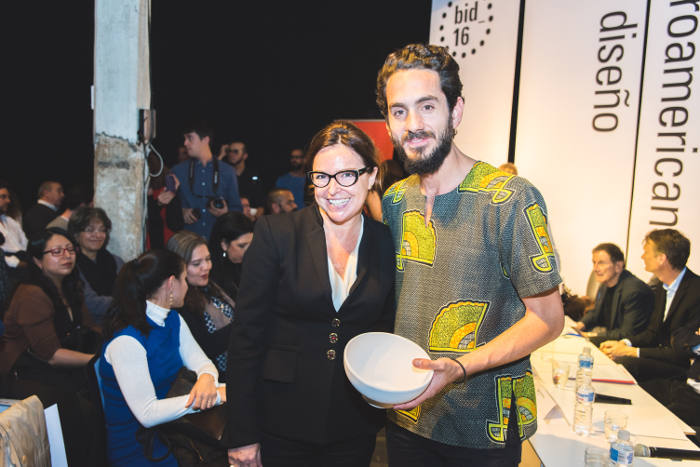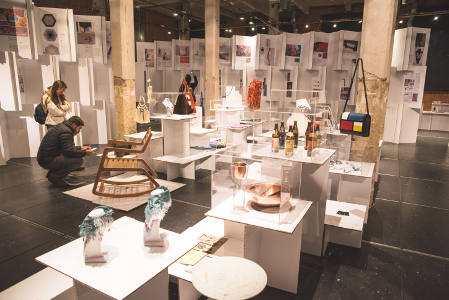-
16 December 2016
Category : Reportage
Creativity at the service of development
The fifth edition of the Ibero-American Design Biennial highlights the work of design intended for people.
 On the left, Isabel Ramos, Director of Information and Special Programmes at FIIAPP; on the right Tiago Dias, the designer of the Bienestar Familia project.
On the left, Isabel Ramos, Director of Information and Special Programmes at FIIAPP; on the right Tiago Dias, the designer of the Bienestar Familia project.We can understand creativity as the ability to create, to provide solutions to problems. This problem-solving ability that affects the daily life of people is the reason for being of international cooperation and for development.
Today there are numerous forms of cooperation between countries: financial cooperation, technical cooperation, triangular cooperation, South-South cooperation, and cultural cooperation. These are different modes of support and collaboration between countries.
Another form of this cooperation between countries is cultural cooperation. For example, through design. A type of design aimed not at the designed object itself but at the people, a type of design focussed on its intended beneficiaries.
This objective was behind the organisation of the Ibero-American Design Biennial (BID) in 2007; the year when 24 designers from 14 Latin American countries signed the Madrid Declaration and decided to join together to constitute the BID advisory committee.
Since then, this design exhibition has been held every two years. It is organised by the Madrid Design Foundation, with which the Spanish Ministry of Foreign Affairs collaborates through Spanish Cooperation , along with the Spanish Agency for International Development Cooperation (AECID) and FIIAPP, as part of the ACERCA project.
Fifth Ibero-American Design Biennial
From 21st November to 29th January, the fifth edition of the BID exhibition can be visited, where more than 1,000 designers from Ibero-America, Spain and Portugal are presenting 470 design proposals..
Spanish Cooperation and the International and Ibero-American Foundation for Administration and Public Policies (FIIAPP) highlighted the work of the projects presented by awarding four honourable mentions and one prize in the category of design for development. In the words of the head of the Cooperation and Cultural Promotion Department of the AECID’s Directorate of Cultural and Scientific Relations, Jorge Peralta, “the qualities of the awarded works are the contribution to a safer, more accessible and more creative world, breaking with the elitist role of design and demonstrating that design understood as a tool for development is also viable”.
Tiago Dias, a designer and one of the creators of the awarded project Bienestar Familia (Family Well-being), explains that their work tries to “provide underprivileged families in the peripheries of the Caldas region in Colombia with access to primary healthcare.” An objective that it meets through the design of health insurance adapted to the living conditions and spending capacity of the beneficiaries.

The other projects selected in the category of design for development offer design solutions in diverse ways. Such as an emergency housing solution for refugees fleeing armed conflicts or natural disasters; irregularly shaped bricks that insulate against heat; a low-cost incubator; and retrofitting solutions for houses to insulate against the cold in the Andean highlands.
This project, which gets bigger each year, brings together leading Ibero-American designers who, from different perspectives, contribute new ways of transforming the world.
The International and Ibero-American Foundation for Administration and Public Policies (FIIAPP) collaborates with the Biennial through the ACERCA Programme, by AECID, whose objective is to promote culture as an engine of development.
Further information here
The views and opinions expressed in this blog are the sole responsibility of the person who write them.




